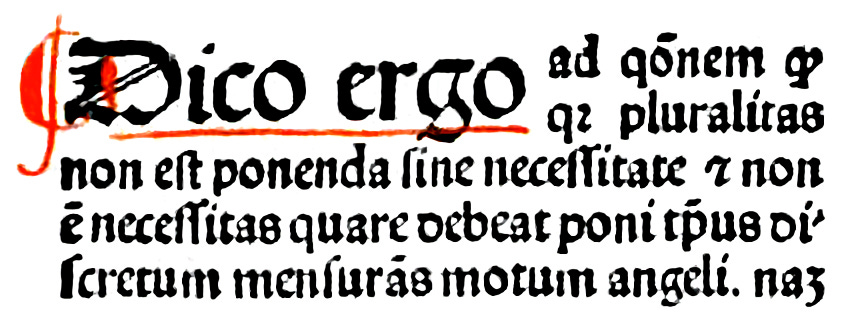My friend Seth Roberts (RIP) once wrote about “preventative stupidity,” a term coined by Orwell. “Preventative stupidity”1 is any slogan that is designed to stop a person from thinking. Perhaps my least favorite example of this is when people invoke “Occam’s Razor.” Or should I say, when they invoke what they think is Occam’s Razor.
Here is Wikipedia on William of Occam. Here it is on Occam’s Razor. You are probably familiar with the concept:
Attributed to William of Ockham, a 14th-century English philosopher and theologian, it is frequently cited as Entia non sunt multiplicanda praeter necessitatem, which translates as “Entities must not be multiplied beyond necessity”,[1][2] although Occam never used these exact words. Popularly, the principle is sometimes paraphrased as “of two competing theories, the simpler explanation of an entity is to be preferred.”[3]
This philosophical razor advocates that when presented with competing hypotheses about the same prediction and both hypotheses have equal explanatory power, one should prefer the hypothesis that requires the fewest assumptions,[4]

Whatever its technical philosophical or logical meaning, I think this Google summary accurately represents how the concept is used in the popular sense.
“The simplest explanation is usually the best,” they say. Seems reasonable, and perhaps in certain situations it is, but I think more often than not it’s used to halt conversation and thinking. Because, practically speaking, they’re not saying “the simplest explanation is usually the best,” they’re saying “the simplest explanation is the best.” Actually, it doesn’t even mean that. What they’re really really saying is “the simple explanation proffered by the mainstream is the best.”
Let me offer an example of the protective stupidity in action: the assassination of JFK. Argue that the government assassinated Kennedy and someone will inevitably invoke Occam’s Razor to counterargue that — ACKSHULLY — this medieval scholastic philosophical-logical principle determines that it must have been Oswald. You see, it’s much simpler for Oswald to have killed JFK than for the government. If the government assassinated Kennedy then it would require a grand conspiracy to execute and cover-up — it would be quite complex — whereas if it’s a lone gunman, it’s less far complex. Therefore, it must be Oswald. As the Google summary says above, this is how Occam’s Razor is used to “debunk” conspiracy theories.
Of course, no theory has been debunked at all. Debunking a conspiracy theory requires far more than invoking a phrase, reciting a rhetorical flourish. Debunking a conspiracy theory — debunking anything for that matter — requires arguments and evidence.
I could just as easily say that the simplest explanation for who killed Kennedy is that it’s the government. Political assassinations have been common throughout world history. A political assassination is the basis of a Shakespeare play that most high school students study.2 Conspiracies — the legal definition of which is “two or more people agreeing to commit a crime” — are committed every day. Prosecutors in every jurisdiction across the country charge defendants with conspiracy every day. When a murder is committed, the murderer is overwhelmingly likely to be the person or persons who stand to profit from the murder the most, not some random crazy person. Yes, a cover-up would presumably be complicated to some extent but we know political cover-ups happen all the time.
I’m not saying one must believe the government killed JFK. I’m saying that Occam’s Razor provides no guidance as to whether the government killed him or not. I’m saying you can frame its “simplicity” argument in more than one way. I’m saying that, the way it’s practically used 99% of the time, Occam’s Razor is a rhetorical device used to shut down inquiry and assert that the mainstream narrative must be true. I don’t think that’s what Occam intended. If a person wants to disagree with my contention that Pearl Harbor was a false flag3, go for it, but that requires more than a two-word cliché.
It’s actually “protective stupidity.” Here’s where it comes from: “Crimestop, in short, means protective stupidity. But stupidity is not enough. On the contrary, orthodoxy in the full sense demands a control over one’s own mental processes as complete as that of a contortionist over his body.” ―George Orwell, 1984
Or used to study.
And the Maine, and the Lusitania, and the Gulf of Tonkin…






